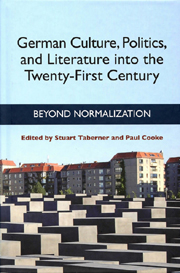Book contents
- Frontmatter
- Contents
- Acknowledgments
- Introduction
- 1 “Normalization”: Has Helmut Kohl's Vision Been Realized?
- 2 Coping with Disparity: Continuity and Discontinuity in Economic Policy since Unification
- 3 Understanding Germany: The Limits of “Normalization” and the Prevalence of Strategic Culture
- 4 “Normalization” through Europeanization: The Role of the Holocaust
- 5 “Representing Normality”: Architecture in Berlin
- 6 “Normalizing” the Past: East German Culture and Ostalgie
- 7 National Memory's Schlüsselkinder: Migration, Pedagogy, and German Remembrance Culture
- 8 The Return of “Undead” History: The West German Terrorist as Vampire and the Problem of “Normalizing” the Past in Margarethe von Trotta's Die bleierne Zeit (1981) and Christian Petzold's Die innere Sicherheit (2001)
- 9 “Normalizing” the “Old” Federal Republic? The FRG between 1949 and 1989 in Recent German Fiction
- 10 Reconciliation between the Generations: The Image of the Ordinary German Soldier in Dieter Wellershoff's Der Ernstfall and Ulla Hahn's Unscharfe Bilder
- 11 “(un)sägliche Vergleiche”: What Germans Remembered (and Forgot) in Former Yugoslavia in the 1990s
- 12 “Normal” as “Apolitical”: Uwe Timm's Rot and Thomas Brussig's Leben bis Männer
- 13 “Narrative Normalization” and Günter Grass's Im Krebsgang
- 14 From “Normalization” to Globalization. German Fiction into the New Millennium: Christian Kracht, Ingo Schulze, and Feridun Zaimoğlu
- 15 Abnormal Consensus? The New Internationalism of German Cinema
- Notes on the Contributors
- Index
Introduction
Published online by Cambridge University Press: 05 February 2013
- Frontmatter
- Contents
- Acknowledgments
- Introduction
- 1 “Normalization”: Has Helmut Kohl's Vision Been Realized?
- 2 Coping with Disparity: Continuity and Discontinuity in Economic Policy since Unification
- 3 Understanding Germany: The Limits of “Normalization” and the Prevalence of Strategic Culture
- 4 “Normalization” through Europeanization: The Role of the Holocaust
- 5 “Representing Normality”: Architecture in Berlin
- 6 “Normalizing” the Past: East German Culture and Ostalgie
- 7 National Memory's Schlüsselkinder: Migration, Pedagogy, and German Remembrance Culture
- 8 The Return of “Undead” History: The West German Terrorist as Vampire and the Problem of “Normalizing” the Past in Margarethe von Trotta's Die bleierne Zeit (1981) and Christian Petzold's Die innere Sicherheit (2001)
- 9 “Normalizing” the “Old” Federal Republic? The FRG between 1949 and 1989 in Recent German Fiction
- 10 Reconciliation between the Generations: The Image of the Ordinary German Soldier in Dieter Wellershoff's Der Ernstfall and Ulla Hahn's Unscharfe Bilder
- 11 “(un)sägliche Vergleiche”: What Germans Remembered (and Forgot) in Former Yugoslavia in the 1990s
- 12 “Normal” as “Apolitical”: Uwe Timm's Rot and Thomas Brussig's Leben bis Männer
- 13 “Narrative Normalization” and Günter Grass's Im Krebsgang
- 14 From “Normalization” to Globalization. German Fiction into the New Millennium: Christian Kracht, Ingo Schulze, and Feridun Zaimoğlu
- 15 Abnormal Consensus? The New Internationalism of German Cinema
- Notes on the Contributors
- Index
Summary
On May 9 2005, the then German Chancellor Gerhard Schröder was in Moscow to take part in the Russian state's day of commemoration for the sixtieth anniversary of the end of the Second World War. The previous year, Schröder had been an invited guest at the sixtieth anniversary of the Allied landings in Normandy on June 6; less than two months later, he would be present in Warsaw at a memorial service to mark the German army's brutal crushing of the Polish capital's uprising in mid-1944. Noting the significance of the invitations he had received to these three events in a newspaper article written in early 2005, the Chancellor concluded: “Die Einladungen in die Normandie, nach Warschau und nach Moskau unterstreichen eindrucksvoll das Vertrauen, das unser Land und seine Außenpolitik heute genießen. Deutschland ist ein geachteter und verantwortungsbewusster Partner in der Welt, weil es sich seiner Vergangenheit gestellt hat.” Germany, it seemed, was “normal” again: an accepted and respected partner, a widely admired champion of co-operation and peaceful coexistence, an esteemed friend to its former enemies, and a country which had learnt from its past and successfully aligned itself with liberal, democratic values.
Schröder's presence in Moscow had forced a change in the schedule for yet another commemorative ceremony generally seen as underscoring the extent to which today's Germany locates the legacy of the Nazi past at the core of its understanding of itself as normal.
- Type
- Chapter
- Information
- German Culture, Politics, and Literature into the Twenty-First CenturyBeyond Normalization, pp. 1 - 16Publisher: Boydell & BrewerPrint publication year: 2006

